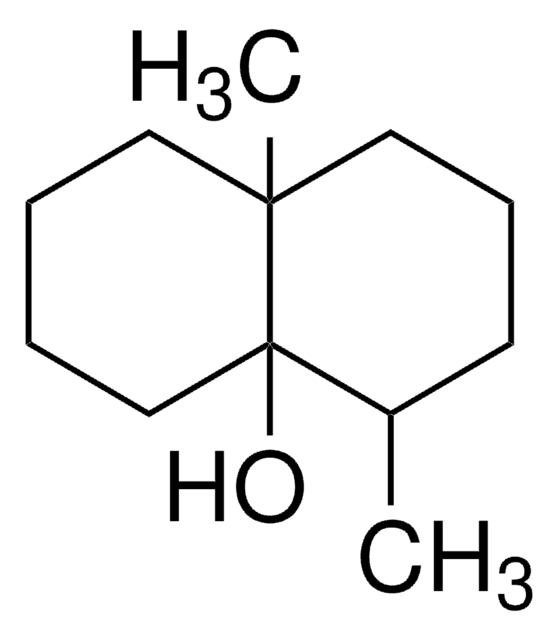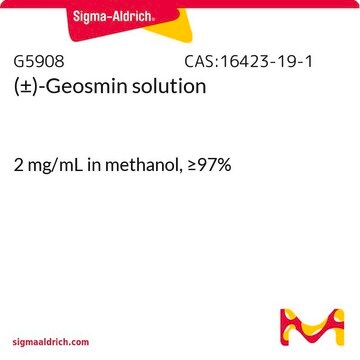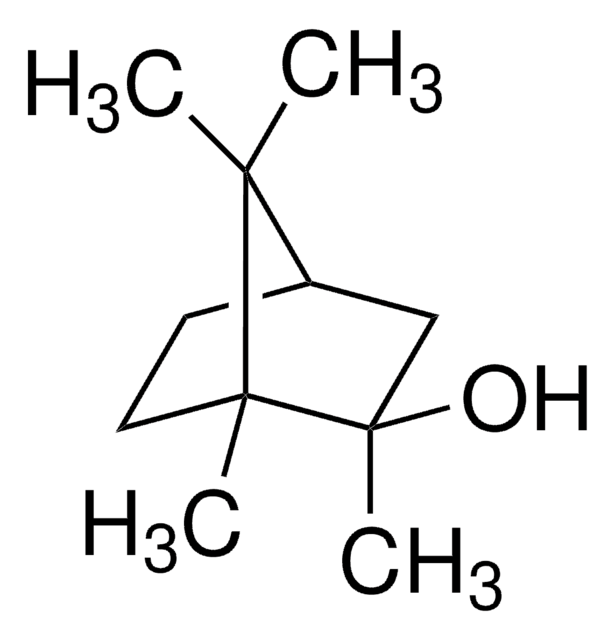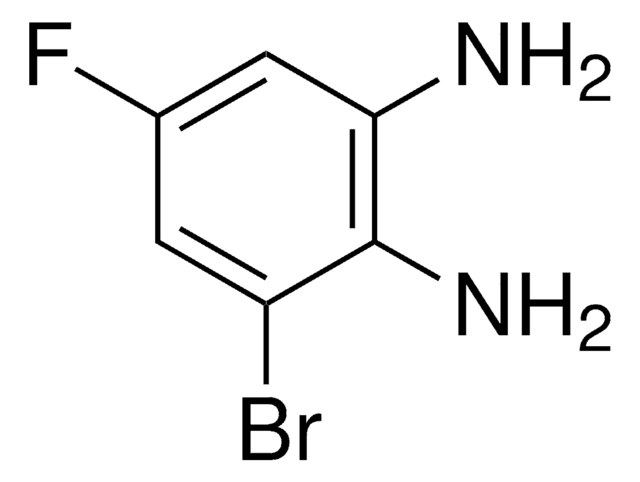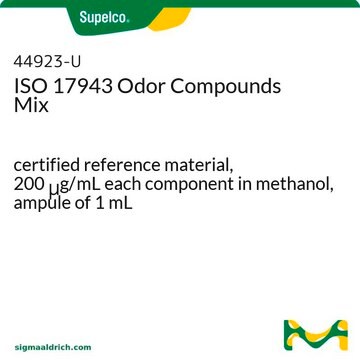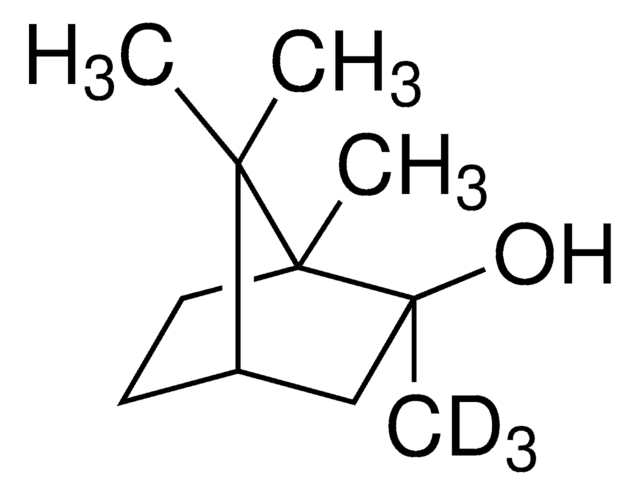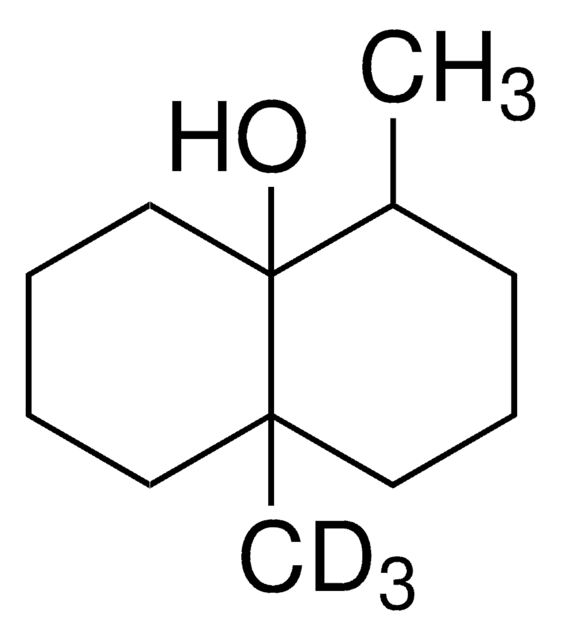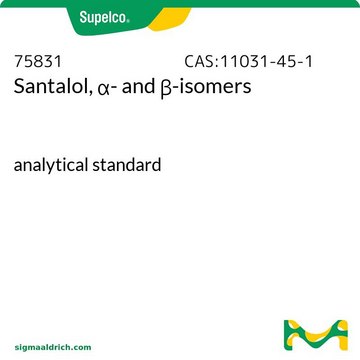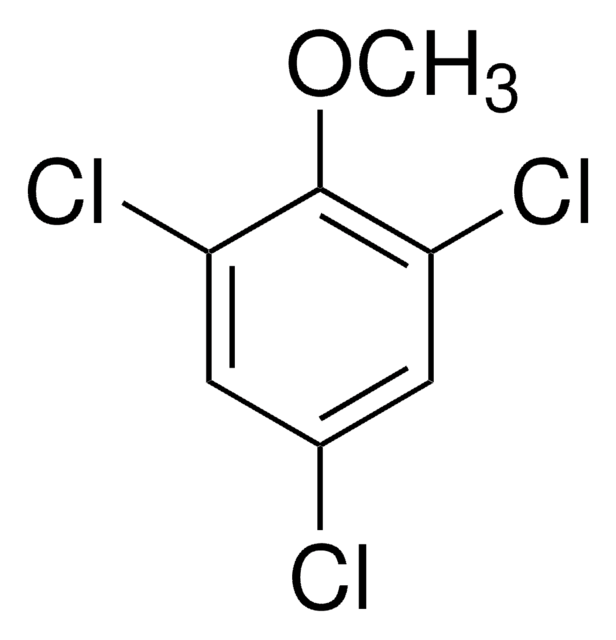743364
2-Methylisoborneol
≥98.0% (GC)
Sinónimos:
exo-1,2,7,7-Tetramethylbicyclo[2.2.1]heptan-2-ol
Iniciar sesiónpara Ver la Fijación de precios por contrato y de la organización
About This Item
Fórmula empírica (notación de Hill):
C11H20O
Número de CAS:
Peso molecular:
168.28
MDL number:
UNSPSC Code:
12352100
PubChem Substance ID:
NACRES:
NA.22
Productos recomendados
Quality Level
assay
≥98.0% (GC)
form
solid
functional group
hydroxyl
InChI
1S/C11H20O/c1-9(2)8-5-6-10(9,3)11(4,12)7-8/h8,12H,5-7H2,1-4H3/t8-,10-,11-/m1/s1
InChI key
LFYXNXGVLGKVCJ-FBIMIBRVSA-N
Application
- Odor compound prioritization in water: A study employed machine learning models combined with non-target analysis to prioritize odorous compounds like 2-Methylisoborneol in surface water, enhancing the effectiveness of environmental monitoring and treatment strategies (Huang et al., 2024).
- Water treatment with carbon materials: The study explored the use of Spirulina-based carbon materials as adsorbents for removing 2-Methylisoborneol from drinking water, also assessing the cyto-genotoxic effects, thus contributing to safer and more effective water treatment solutions (Antonopoulou et al., 2024).
- Quantification in aquaculture: Improved methods for quantifying 2-Methylisoborneol in farmed fish were developed using stable isotope dilution gas chromatography-mass spectrometry, facilitating better management of water quality in aquaculture environments (Dupre et al., 2024).
Packaging
Bottomless glass bottle. Contents are inside inserted fused cone.
signalword
Danger
hcodes
Hazard Classifications
Flam. Sol. 1 - Skin Irrit. 2
Storage Class
4.1B - Flammable solid hazardous materials
wgk_germany
WGK 3
flash_point_f
Not applicable
flash_point_c
Not applicable
Elija entre una de las versiones más recientes:
¿Ya tiene este producto?
Encuentre la documentación para los productos que ha comprado recientemente en la Biblioteca de documentos.
Los clientes también vieron
Mikael A Petersen et al.
Journal of agricultural and food chemistry, 59(23), 12561-12568 (2011-11-02)
Globally, aquaculture systems with water recirculation experience increasing problems with microbial taste and odor compounds (TOCs) such as geosmin and 2-methylisoborneol (MIB). This study investigated the content of geosmin and MIB in water and the flesh of 200 rainbow trouts
Marc Auffret et al.
FEMS microbiology ecology, 84(2), 235-247 (2012-12-12)
A variety of factors affecting water quality in recirculating aquaculture systems (RAS) are associated with the occurrence of off-flavours. In this study, we report the impact of water quality on the bacterial diversity and the occurrence of the geosmin-synthesis gene
Kristin Zoschke et al.
Water research, 46(16), 5365-5373 (2012-08-04)
The occurrence of the taste and odour compounds geosmin and 2-methyl isoborneol (2-MIB) affects the organoleptic quality of raw waters from drinking water reservoirs worldwide. UV-based oxidation processes for the removal of these substances are an alternative to adsorption and
Kristin Zoschke et al.
Water research, 45(15), 4544-4550 (2011-07-15)
The adsorption of the taste and odour (T&O) compounds geosmin and 2-methylisoborneol (2-MIB) onto powdered activated carbon (PAC) has been studied under conditions which are typical for a drinking water treatment plant that uses reservoir water for drinking water production.
Lior Guttman et al.
Applied and environmental microbiology, 78(2), 363-370 (2011-11-15)
Using a relatively simple enrichment technique, geosmin and 2-methylisoborneol (MIB)-biodegrading bacteria were isolated from a digestion basin in an aquaculture unit. Comparison of 16S rRNA gene sequences affiliated one of the three isolates with the Gram-positive genus Rhodococcus, while the
Nuestro equipo de científicos tiene experiencia en todas las áreas de investigación: Ciencias de la vida, Ciencia de los materiales, Síntesis química, Cromatografía, Analítica y muchas otras.
Póngase en contacto con el Servicio técnico